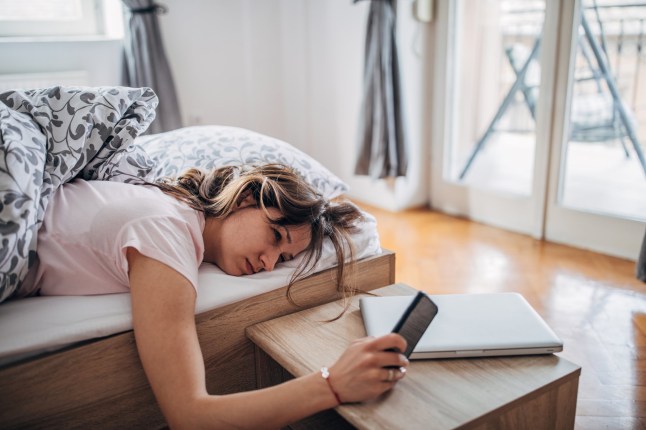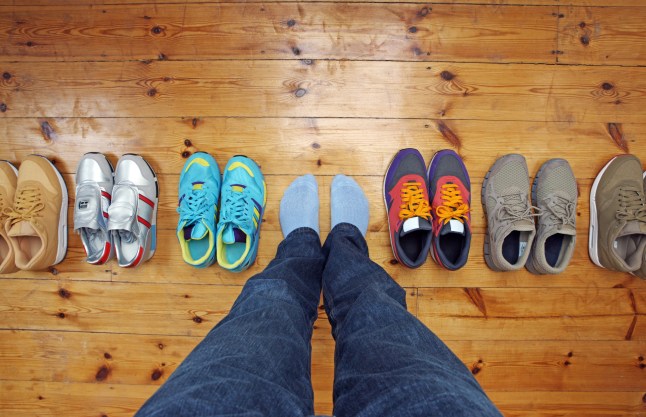
We all want to ensure we have as much time as possible on this Earth, right? And the likes of exercising regularly, following a healthy, balanced diet, and generally keeping our bodies in good shape increases our chances of doing this.
Of course, we’re not all perfect, and many of us fall victim to certain unhealthy habits -from ordering fatty takeout instead of making fresh meals to having one too many on a Friday night.
But did you know, a number of other, seemingly innocuous acts can contribute to bad health, too?
To find out some of the worst things you can do for your body (that aren’t the usual suspects), we spoke to Superdrug online doctor Dr Babak Ashrafi.
1. Netflix marathons

An occasional binge-watch can be a great way to unwind.
Let’s face it, who hasn’t had a duvet day dedicated to watching multiple seasons of their favourite show?
Unfortunately, Dr Ashrafi warns of the dangers of doing this too frequently.
The expert says: ‘Spending too many hours glued to the screen without moving can leave you feeling sluggish and stiff, along with reducing your metabolism.
To keep your body happy, try stretching, standing up, or taking a short walk between episodes – it’ll help boost circulation and prevent that post-binge slump’
2. Snoozing your alarm

We get it. It’s 6am on a Monday morning.
You’re exhausted from a busy weekend, so you hit snooze to give yourself an extra half hour.
While it may feel like you’re getting more rest, Dr Ashrafi warns that ‘fragmented sleep can leave you groggy and more tired throughout the day.’
Instead, try setting your alarm for when you actually need to wake up and get out of bed straight away.
3. Not taking time off

‘Chronic stress can take a toll on both mind and body, increasing the risk of burnout, anxiety, and fatigue,’ explains Dr Ashrafi.
Not taking regular breaks – whether it’s a holiday, a mindful moment, or simply prioritising self-care – can exacerbate stress levels and have a negative effect on long-term well-being.
Additionally, the expert notes that it’s important to look after your body during times of change, such as pregnancy or menopause.
‘This can make all the difference in how you feel day to day,’ Dr Ashrafi adds.
4. Hiding out indoors

‘Spending too much time indoors, especially without natural light exposure, can disrupt your circadian rhythm, leading to poor sleep and low energy levels,’ notes the doctor.
On top of this, you’re also more likely to suffer from a vitamin D deficiency, which is linked to weakened immunity, low mood, and bone health issues.
The solution? Even if it’s just for 10 minutes, head for a quick walk around the block on your lunch break. Not only will you get your body moving, but you’ll also find you have a lot more energy afterwards.
5. Overtraining

Granted. Exercise is essential for our mental and physical health. No one is going to tell us otherwise.
But there is such a thing as too much exercise.
Dr Ashrafi educates: ‘Overdoing it without proper recovery can lead to muscle fatigue, increased injury risk, and even hormonal imbalances.’
The bottom line? Listen to your body – rest days are just as important as workout days.
6. Wearing the wrong shoes

You might be thinking, ‘What does my choice in footwear have to do with my health?’
Well, it’s as simple as this: ‘Poor footwear can put strain on your joints, cause foot pain, and even contribute to back and knee issues.’
Instead, wear supportive shoes suited to your activities, as it can help prevent long-term problems.
7. Not stretching

Picture this: you’re in the office chained to your desk for eight hours a day, five days a week (with the exception of toilet and multiple coffee breaks).
Morning and night, you go straight from your desk to your car to your sofa to your bed.
That’s not many steps, nor is it many stretches.
While you may not think the latter is important, Dr Ashrafi assures us that it is: ‘Neglecting to stretch can lead to stiff muscles, reduced flexibility, and an increased risk of strains and injuries. Even five minutes of stretching a day can improve mobility and prevent discomfort’.
8. Drinking too much coffee

May we direct you to the above point? In an office environment, coffee is life.
It’s the only thing that helps us get through the day.
Unfortunately, your latte habit might be just as bad for your health as it is for your wallet.
Dr Ashrafi explains: ‘While caffeine can give you an energy boost, too much can lead to anxiety, disrupted sleep, and increased heart rate.’
Still need your coffee fix? Stick to a moderate intake (no more than 400mg per day) and cut back in the afternoon to avoid sleep disturbances.
9. Midnight snacking

‘Eating late at night can interfere with digestion, cause acid reflux, and contribute to weight gain over time, especially if you’re reaching for sugary or processed snacks.
If you’re truly hungry, opt for something light and protein-rich, like yoghurt or nuts.’
That’s us told.
10. Bad sleeping positions

Though it’s hard to believe, many people love to sleep on their stomachs.
Seriously.
But it’s bad news for those who catch their zzzs in awkward positions, as the expert warns of the physical problems they may cause.
This includes straining your neck and spine, which can lead to long-term aches and pains. ‘A good pillow and mattress, plus sleeping on your back or side, can help support proper spinal alignment,’ Dr Ashrafi says.
11. Being ‘too’ online

We’ve all been warned about the negative effects of being on our screens too much.
The problem is, we’re living in a world that is online 24/7, whether it’s keeping up with the latest social media trends or simply overworking ourselves.
From a health perspective, Dr Ashrafi’s advice would be that TikTok can wait.
The doctor says, ‘Constant exposure to screens can overstimulate your brain, disrupt your sleep cycle, and increase stress levels. Try setting limits on screen time, especially before bed, and take digital detox breaks to protect your mental health.’
Do you have a story to share?
Get in touch by emailing MetroLifestyleTeam@Metro.co.uk.